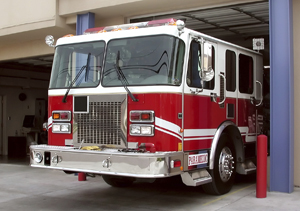HANCOCK COUNTY — The firefighters call her “Dispatch Debby.” She’s the automated voice they hear over the emergency alert system telling them they have a run to make and where they need to go.
Officially, the system is called PrimeAlert, and it recently went online at the Hancock County 911 Center and county fire stations. First-responders have been testing it the past couple of weeks, hoping that it works as promised: getting information out to first-responders more quickly and with more precision.
The system also allows for “zoned” dispatching, so that only those first-responders needed for a call receive the alert. That means other people in the fire station aren’t disturbed if the call comes in during the middle of the night. They can sleep right through it unless their unit is later summoned.
The new program also allows a 911 dispatcher to stay on the line with a caller while sending help, with the push of a button. Because the response is automated, “Dispatch Debby” is the one who calmly relays information in an easy-to-understand format that’s repeated the same way every time an ambulance or fire truck is needed.
“Instead of waiting 40 or 50 seconds while the dispatcher is getting the other basic information, that run is coming out to us right away, and it’s speeding up our runs,” said James Roberts, chief of the Greenfield Fire Territory.
Often, personnel from both fire stations in Greenfield will roll when a call comes in. With the new system, the computer-based alert doesn’t bother both Greenfield fire stations unless both are needed.
Officials with 911 and Locution Systems Inc., which pioneered the automated voice technology, are still working out a few kinks in the system, said Corey Breese, public information officer for the Greenfield Fire Territory. But when the rough patches are ironed out, it’s going to be a solid system, he said.
“Right now, the volume is a little hard to hear,” Breese said. But, he pointed out, the department had to go live with the system to help uncover the bugs.
Locution works like most alert systems in sounding a tone, but it immediately starts talking, sending out the address and details, as well as beaming the information into fire trucks and cell phones.
“If you’re lying in bed at three in the morning, you really do kind of want to have an idea of what you are doing before you make it down to your truck,” Breese said.
Tony Bratcher, Sugar Creek Township Fire Department public information officer, thinks Locution is a great way for dispatchers to pass along information to first-responders.
“It’s another wonderful addition to the county,” Bratcher said. “We’re getting information so much quicker, and it’s up to date.”
Prior to Locution, if a dispatcher was taking a call, he or she would need to make sure the caller stayed on the line while the dispatcher sent out the alert. Dispatchers are able to work quickly and generally can provide that information to first-responders in under a minute. But to a frantic caller, that’s an eternity.
“Now, when it gets to the point where we’re ready to dispatch, all we do is hit a button, and we can keep talking to whoever’s called,” said Greg Duda, public information officer for the county 911 center.
Locution in essence does the dispatching for the 911 operator. Duda said callers don’t have to wait because the dispatcher lets the automated system handle the run information.
Getting the system up and running was not easy. It came with a full audio list of street names, and officials at the 911 center had to listen to every one to make sure they were pronounced correctly. They also had to make sure addresses were entered correctly.
In the next six to eight months, officials expect to make minor tweaks and corrections, such as how fast the automated dispatcher talks, the pronunciation of words and the order in which information is delivered.
Unlike the firefighters, officials with the 911 center haven’t named the computer located in the 911 center basement. Duda said they’ll do that after she’s completely ready and have listened to her final voice inflections. Then they’ll come up with a name that suits her best.
“She doesn’t sound half bad,” Duda said with a laugh.
[sc:pullout-title pullout-title=”How it works” ][sc:pullout-text-begin]
PrimeAlert was developed by Locution Systems Inc. specifically for Fire-EMS dispatch.
The company touts 99.9 percent understandability and special pronunciation capabilities.
Clear and flexible voice uses inflection for a natural sound for critical information.
Pre-recorded word phrase audio database provides highly understandable automated voice at time of delivery.
Syllable-based audio database supports common place names and easily handles on-the-fly data entered locally.
Updates are easy and done as a routine part of regular maintenance.
Source: Locution.com
[sc:pullout-text-end]





